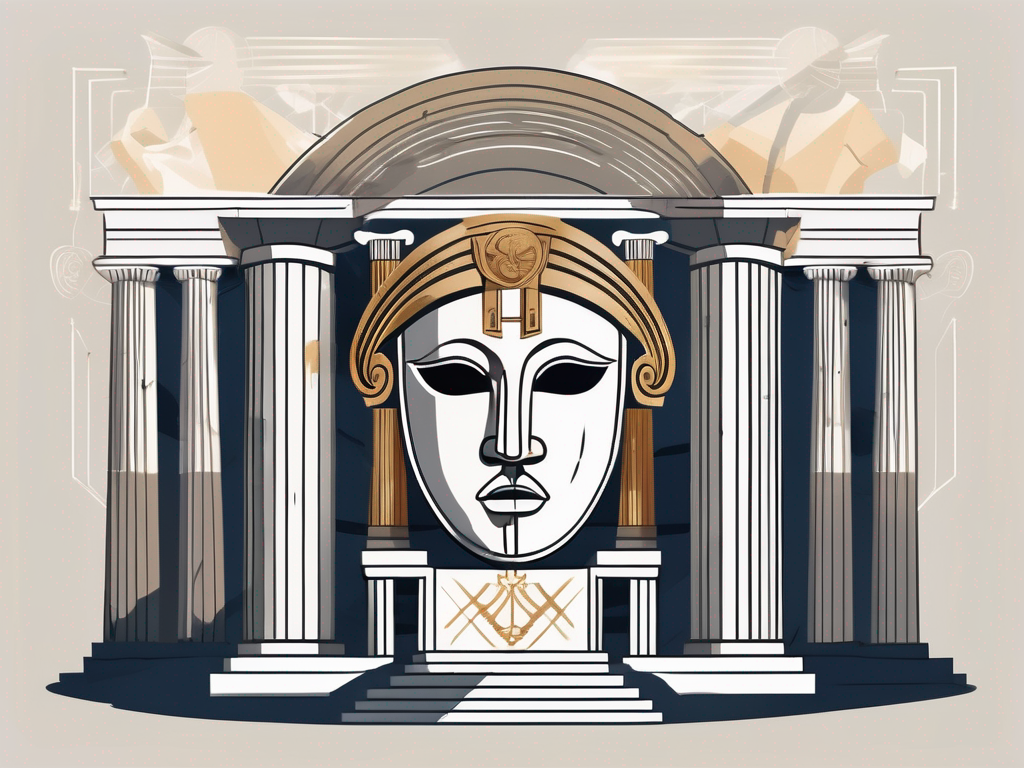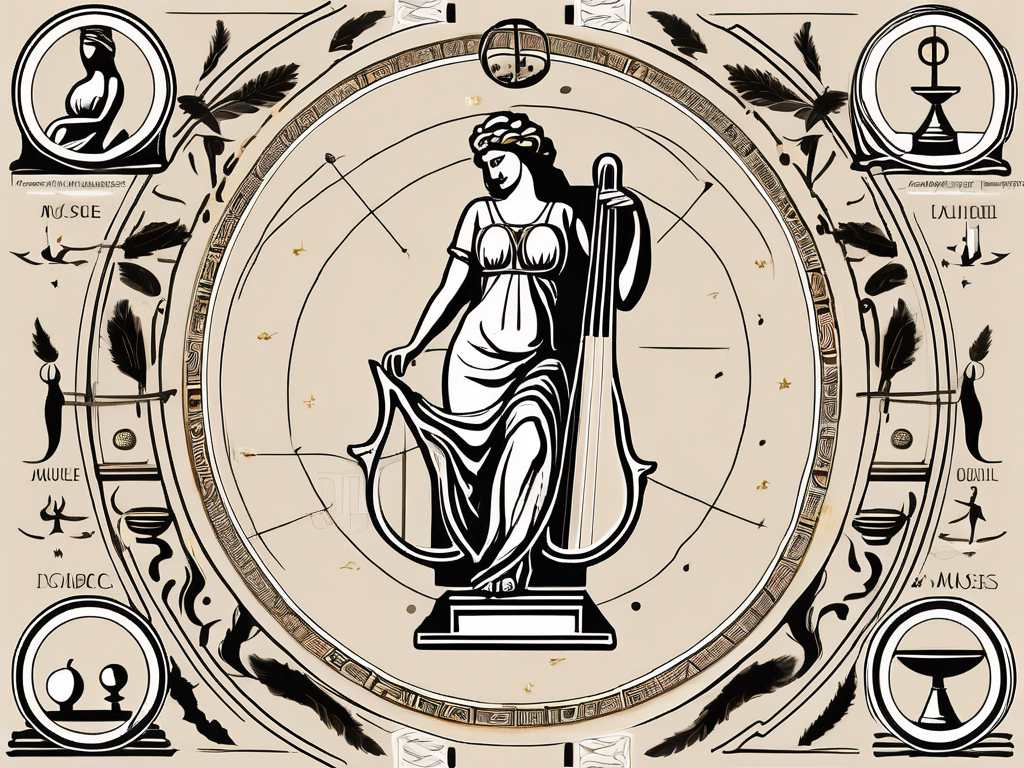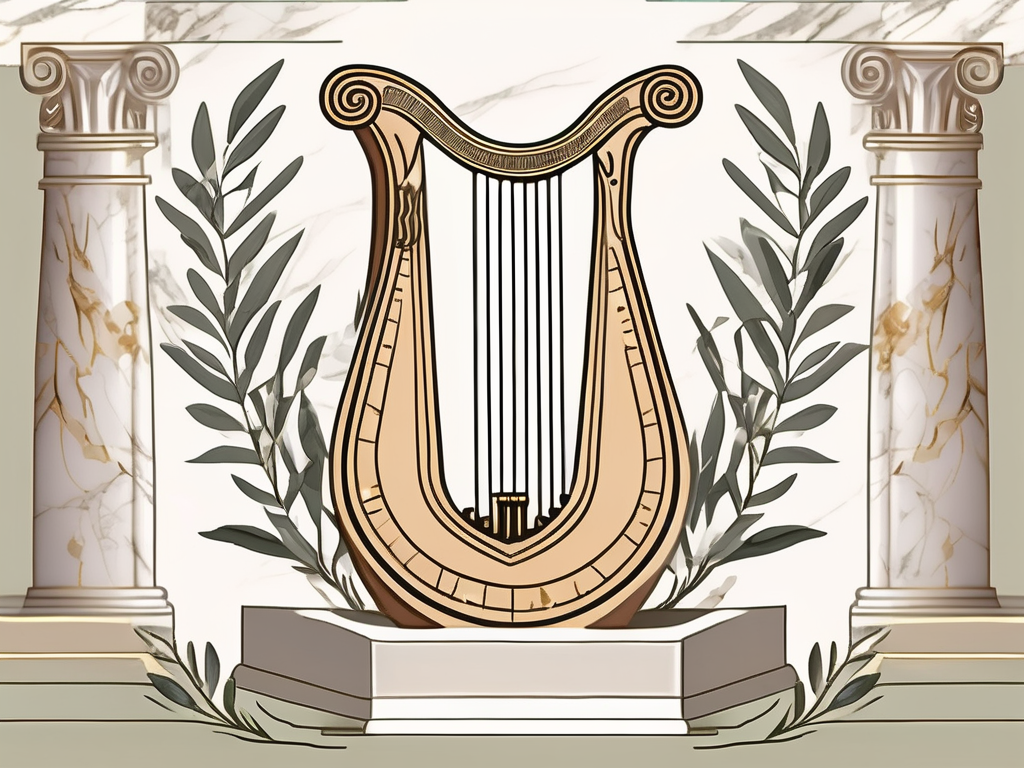In the realm of Greek mythology, there exists a captivating figure known as Melpomene, the goddess of tragedy. Her story is filled with mystery and intrigue, and her role in Greek culture cannot be underestimated. In this article, we will delve into the origins of Melpomene, explore her influence in Greek tragedy, examine her transition from muse to goddess, and uncover her lasting legacy in modern culture.
The Mythical Origins of Melpomene
Let us begin by unraveling the enigmatic origins of Melpomene. According to ancient Greek legends, she was born to Zeus, the king of the gods, and Mnemosyne, the titaness of memory. Melpomene had an impressive lineage, as she descended from such powerful deities.
But what led Zeus and Mnemosyne to come together and conceive Melpomene? It is said that Zeus, being the ruler of the gods, was drawn to Mnemosyne’s exceptional intellect and ability to retain knowledge. Their union was a merging of power and wisdom, resulting in the birth of Melpomene, a muse who would inspire and guide the creation of tragic works.
Melpomene’s Parentage and Siblings
As one of the nine muses, Melpomene had eight siblings, each presiding over different art forms. These muses were a source of inspiration for poets, musicians, and artists. Melpomene, specifically, was associated with tragedy, guiding the creation of tragic works through her influence.
Among her siblings, there was Calliope, the muse of epic poetry, who inspired the likes of Homer and Virgil to create timeless tales of heroism. There was also Terpsichore, the muse of dance, whose graceful movements brought joy and rhythm to the world. Each muse had their unique domain, but it was Melpomene’s connection to tragedy that set her apart.
Melpomene and the Birth of Tragedy
The birth of tragedy in ancient Greece was intricately tied to Melpomene’s role as a muse. It was believed that she would inspire playwrights and performers, infusing their works with sorrow and depth. Her influence was paramount in shaping Greek tragedy, which became a significant part of their culture.
Tragedy, as an art form, allowed the Greeks to explore the depths of human emotions and confront the harsh realities of life. Through Melpomene’s guidance, playwrights like Aeschylus, Sophocles, and Euripides crafted masterpieces that delved into themes of fate, hubris, and the consequences of human actions.
The tragic plays performed in ancient Greece were not mere entertainment; they were a cathartic experience for the audience. Melpomene’s presence was felt in every tear shed and every gasp of awe, as the audience was transported to the realm of tragedy, where they could confront their own fears and contemplate the complexities of the human condition.
As the muse of tragedy, Melpomene became a symbol of the power of storytelling and the ability of art to evoke deep emotions. Her influence extended beyond the stage, permeating the culture and leaving a lasting legacy that continues to inspire artists to this day.
The Role and Influence of Melpomene in Greek Tragedy
Now, let us delve further into Melpomene’s role and her impact on Greek tragedy. The symbolism associated with her in Greek literature and art showcases her profound influence.
As we explore Melpomene’s significance, it becomes evident that she was not merely a passive figure but an active force that shaped the very essence of Greek tragedy. Playwrights of ancient Greece recognized her power and invoked her name before embarking on the creation of their tragic works. In doing so, they sought her inspiration and guidance, acknowledging her as the muse of tragedy.
Melpomene’s presence loomed large in the world of Greek literature, infusing the narratives with sorrow, loss, and catharsis. Her symbolism went beyond a mere representation of tragedy; she embodied the emotions and themes that defined the genre. The tragic hero’s downfall, the exploration of human suffering, and the pursuit of catharsis were all elements that Melpomene personified.
Melpomene’s Symbolism in Greek Literature
In Greek literature, Melpomene symbolized the essence of tragedy. Playwrights invoked her name before embarking on the creation of their tragic works. Her presence loomed large, infusing their narratives with sorrow, loss, and catharsis.
Furthermore, Melpomene’s influence extended beyond the realm of individual plays. Her symbolism permeated the collective consciousness of ancient Greece, shaping the way tragedy was both perceived and understood. The mere mention of her name evoked a sense of anticipation and reverence, signaling the audience that they were about to witness a profound exploration of the human condition.
It is worth noting that Melpomene’s impact was not limited to the realm of literature alone. Her symbolism found expression in various forms of art, further solidifying her association with tragedy.
Melpomene’s Depiction in Greek Art
Greek art offers us a glimpse into Melpomene’s portrayal, further emphasizing her connection to tragedy. She was often depicted with a tragic mask in one hand and a shepherd’s staff in the other. This imagery reinforced her role as the muse of tragedy and the guiding force behind the creation of tragic performances.
The tragic mask held by Melpomene served as a visual representation of the emotions and turmoil that characterized the tragic genre. It encapsulated the pain, anguish, and despair that the characters in Greek tragedies experienced. The shepherd’s staff, on the other hand, symbolized her role as a guide, leading both playwrights and audiences through the emotional journey of tragedy.
These artistic depictions of Melpomene not only captured her essence but also perpetuated her influence. They served as a constant reminder of the power and significance of tragedy in Greek culture, ensuring that Melpomene’s legacy endured.
Melpomene’s Transition from Muse of Chorus to Goddess of Tragedy
Throughout time, Melpomene’s role underwent a significant transformation. She transitioned from being solely a muse of the chorus to becoming recognized as a full-fledged goddess of tragedy.
But what led to this evolution? How did Melpomene’s importance grow over time, and what impact did her transition have on Greek culture?
The Evolution of Melpomene’s Role
As Greek theater evolved, Melpomene’s importance grew. She became central to the tragic performances, guiding playwrights and actors alike. No longer just a source of inspiration, she was now worshipped as an actual deity.
Playwrights sought Melpomene’s favor, believing that her divine guidance would ensure the success of their tragedies. Actors, too, looked to her for inspiration and protection, believing that she would grant them the ability to portray the depths of human suffering with authenticity and skill.
Melpomene’s transformation from muse to goddess marked a significant shift in the perception of tragedy. It elevated the art form to a higher level, emphasizing its cultural and spiritual significance.
The Impact of Melpomene’s Transition on Greek Culture
Melpomene’s transition from muse to goddess had a profound impact on Greek society. Tragedy became revered, and theaters dedicated to her were built throughout ancient Greece.
These theaters became gathering places for the community, where people from all walks of life could come together to witness the powerful performances that Melpomene inspired. Tragedy provided a platform for the Greeks to explore the complexities of the human experience, delving into themes of love, loss, fate, and the struggles of mortal existence.
Through the cathartic experience of watching tragic plays, the audience was able to reflect on their own lives and find solace in the shared understanding of the human condition. Melpomene’s presence in these theaters was palpable, as her divine influence permeated every aspect of the performances.
But Melpomene’s impact extended beyond the confines of the theater. Her transition to goddess status brought about a cultural shift, where tragedy became not just a form of entertainment, but a means of spiritual and emotional exploration.
Artists and philosophers began to delve deeper into the nature of tragedy, exploring its philosophical implications and its ability to evoke profound emotional responses. Melpomene’s transformation sparked a renaissance of tragic art, with playwrights and poets striving to create works that would honor her divine status.
Ultimately, Melpomene’s transition from muse of the chorus to goddess of tragedy forever changed the landscape of Greek culture. Her influence elevated tragedy to a revered art form, allowing the Greeks to confront the complexities of life and find solace in the shared experience of human suffering.
Melpomene’s Legacy in Modern Culture
Even in modern times, Melpomene’s legacy endures, leaving an indelible mark on our culture.
Melpomene’s Influence on Modern Theatre
The influence of Melpomene can be seen in contemporary theater. Tragedies continue to captivate audiences, evoking a range of emotions and provoking introspection. Playwrights, directors, and actors draw inspiration from the ancient Greek goddess of tragedy, continuing to honor her enduring legacy.
Melpomene in Contemporary Art and Literature
Melpomene’s presence extends beyond theater. She has been immortalized in works of contemporary art and literature, further bridging the gap between ancient Greece and the modern world. Artists and writers find inspiration in her, paying homage to the goddess whose influence transcends time.
In conclusion, Melpomene, the Greek goddess of tragedy, remains an enigma waiting to be unveiled. From her mythical origins to her celebrated role in Greek tragedy and her lasting legacy in modern culture, Melpomene continues to captivate our imagination. As we continue to explore and delve into the rich tapestry of Greek mythology, we are reminded of the profound impact that Melpomene, the goddess of tragedy, has had on the arts and human expression.












